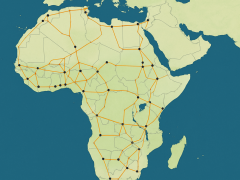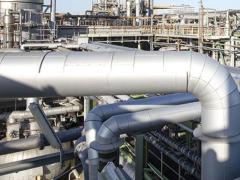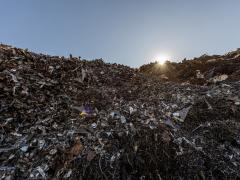The National Radioactive Waste Disposal Institute (NRWDI) is expected to assume full operational control of South Africa’s Vaalputs radioactive waste disposal facility in July, pending regulatory approval. The site, located in the Northern Cape, has been operated by the South African Nuclear Energy Corporation (NECSA) since its commissioning in 1986.
However, statutory responsibility for radioactive waste disposal rests with the NRWDI, which was established under the National Radioactive Waste Disposal Institute Act of 2008 and came into effect in 2009. While the NRWDI has held the legal mandate since its establishment, it has not had operational control of Vaalputs – a transition now underway as the NRWDI seeks a nuclear installation licence from the National Nuclear Regulator to formalise the transfer.
Addressing the Parliamentary Portfolio Committee on Electricity and Energy, the NRWDI’s CEO, Riedewaan Bakardien, confirmed that all outstanding regulatory issues for the licence transfer have been resolved and that the application is scheduled to serve before the regulator’s board in July 2025.
Once licensed, the NRWDI will take over the Vaalputs low-level waste disposal function and begin collecting waste disposal fees from radioactive waste generators, primarily Eskom and NECSA. According to Justin Daniel, the NRWDI’s CFO, low-level waste operations are projected to generate approximately R15 million annually, ring-fenced for the operational costs of Vaalputs. This revenue stream will supplement the NRWDI’s current full reliance on government appropriations.
The NRWDI is also advancing the development of a centralised interim storage facility (CISF) for the long-term storage of spent nuclear fuel from Eskom’s Koeberg power station, Bakardien said. “Koeberg’s used-fuel assemblies are currently stored in spent-fuel pools and dry casks on site but additional storage capacity is required as Koeberg moves into its life-extension phase. Unit 1 has already received regulatory approval for a 20-year extension to 2044 with Unit 2’s application still under review,” he said.
Preliminary design work for the above-ground CISF is underway following the award of an engineering contract in March 2025. An environmental impact assessment is also in progress. The facility is scheduled to receive Koeberg’s spent fuel from 2030 onwards, providing an interim solution until a permanent deep geological repository is established, Bakardien confirmed.
The capital cost for the CISF is approximately R1,9 billion, subject to final design adjustments. The NRWDI is developing a funding plan in consultation with Eskom and the Development Bank of Southern Africa, Bakardien said.













